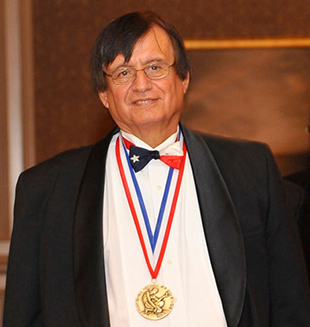

Richard A. Tapia (1939 )
“I can help so many people that are similarly situated--people who could fall through
cracks the way I almost fell through cracks.”
–Richard A. Tapia
National Medal of Science (NMS) recipient in 2010 “for his pioneering and fundamental contributions in optimization theory and numerical analysis and for his dedication and sustained efforts in fostering diversity and excellence in mathematics and science education.”
Richard Tapia was born in Santa Monica, Calif., to Mexican immigrant parents who had come to the United States as young teenagers. Tapia, who attended Los Angeles public schools, was the first in his family to get a college education. He earned his bachelor’s degree in mathematics from the University of California, Los Angeles, (UCLA) in 1961, and went on to receive his Ph.D. in mathematics from UCLA in 1967. During his time at UCLA, Tapia also pursued drag racing, setting several national records.
Tapia joined the faculty at Rice University in 1970 and was promoted to full professor in 1976. He has had a prolific career, having authored or co-authored two books and over 80 mathematical research papers. He is credited with helping to develop “numerical optimization,” a method that has been adopted by big industries for predicting and optimizing performance. Tapia was the first Mexican-American elected to the National Academy of Engineering and in 1996, President William J. Clinton appointed him to the National Science Board.
In addition to his research in computational and mathematical science, Tapia is known as a champion for diversity in the field. He serves as director of the Center for Excellence and Equity in Education and, thanks to his leadership, the Computational and Applied Mathematics Department at Rice has become a national leader in producing women and underrepresented minority Ph.D. recipients in the mathematical sciences.
Tapia organizes professional development opportunities for mathematics, science and computer science teachers around the country. He also directs numerous successful summer programs that provide opportunities for female and minority students at Rice to get involved with science and mathematics and to tutor at high schools in their communities. A talk that he delivers to inner city youth, “Math at Top Speed,” examines the mathematics of drag racing.
Upon receiving the NMS, Tapia commented, “This is not a dream come true to me because I never dreamt that I would win this award. And I said, ‘Wow, this takes me to the top.’ I know that I deserve the feeling, OK, the feeling of being happy, and I’m enjoying it, and I’m walking on air. I don’t know how long it’s going to last, but I’m going to try to make it last as long as I can.”
Image descriptions and credits
Any opinions, findings, conclusions or recommendations presented in this material are only those of the presenter grantee/researcher, author, or
agency employee; and do not necessarily reflect the views of the National Science Foundation.


